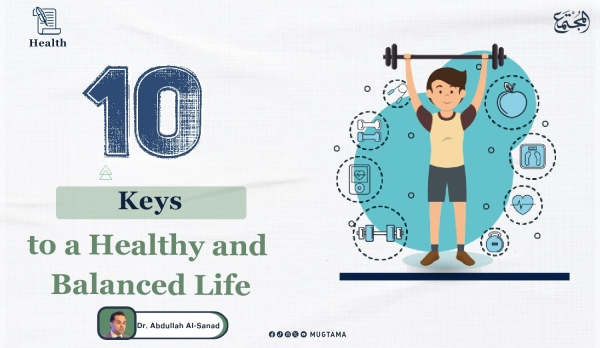The month of Ramadan is not just about abstaining from food and drink; it is a journey towards balance between the body and soul, and an opportunity to reset our lifestyle for the better. How can we make our fasting light and active? How can we balance food and rest to gain the most health benefits? Dr. Abdullah Al-Sanad, the official spokesperson for the Ministry of Health, answers common questions that many may have about fasting and its health implications, so we can navigate this month with strength and wellness.
- What is the secret behind feeling energetic at times and fatigued at other times during fasting?
Fasting itself is not the cause; it's how you manage it! Your food, sleep, and rest hours determine whether your day is filled with activity or exhaustion. If you master the balance, your day will feel lighter; if you neglect it, fasting will become a burden.
- Is hunger during fasting a weakness or strength?
Hunger is not a weakness; it is a reminder that strength lies not in fullness but in endurance. Those who manage their fasting wisely find clarity of mind and lightness of body, while those who have a balanced pre-dawn meal enjoy their day with ease and energy.
- Coffee and fasting... a temporary separation or a lasting headache?
For those who are accustomed to it, the separation in the morning might feel heavy, but it is not endless! Gradually reducing coffee intake and increasing water consumption in the evening make the fast feel clearer, and reuniting with coffee after iftar becomes a comfort rather than a necessity.
- Does eating a lot at Iftar compensate for the hours of fasting?
Fasting is not about deprivation to compensate for it later, but a means of refinement to benefit from it! If you fill your stomach all at once, you’ll feel burdened; however, if you break your fast with balance, you'll provide your body with what it needs without strain. The secret lies not in quantity but in method and moderation.
- When is the best time to exercise during Ramadan?
Exercise is the art of timing, and timing is the secret to performance! Exercising before iftar might be burdensome, while after iftar is energizing. The key is balance—neither overexertion nor laziness should hinder you.
6- Is staying up late in Ramadan a necessity or a habit?
Staying up late is a double-edged sword; it can be a spirituality that blossoms in hearts or an exhaustion that steals your daytime. Make your nights a time for worship and rest, for the weary mind cannot focus, and the tired body cannot be humble.
7- Coffee at Suhoor... Is it a friend or an enemy?
Coffee, the companion of thought and the essence of mood can let you down at Suhoor! It leaves quickly and leaves you thirsty. If you can't bear to be without it, then have it after Iftar, in a dose that uplifts without overwhelming.
8- What’s better: sleeping before Fajr or after it?
If you sleep early, it is better for your body and mind. If the night is long for you, make sure to have a nap, as it compensates for the rest you missed. Being deprived of sleep exhausts your spirit before it exhausts your body, and sleep is a blessing that aids you, not a distraction that hinders you.
9- In Ramadan, how do you divide water intake to make it a remedy, not a burden?
Water is like rain; if it falls all at once, it floods, and if it is delayed, it leads to drought! Drink it mindfully, in doses that revive rather than overwhelm, and between Iftar and Suhoor, make sure to allocate a balanced amount, for balance is the secret to wellness, and moderation is life.
10- How does Ramadan enhance the social dimension of a person’s health?
After Taraweeh prayers, doors open just as hearts do, filling the gaps of absence and mending broken connections. Visiting one another is a life for the spirit, just as food is life for the body. Health is finding those you feel at home with, as well as what sustains your well-being.
Ramadan is a golden opportunity to rearrange our health priorities; those who manage it well find comfort for the body and clarity for the mind, while those who neglect balance feel exhaustion and hardship. With moderate food, organized sleep, and spirituality that nourishes the heart, Ramadan can transform into a complete health experience. Let this month be a new beginning for lasting habits beyond it.


